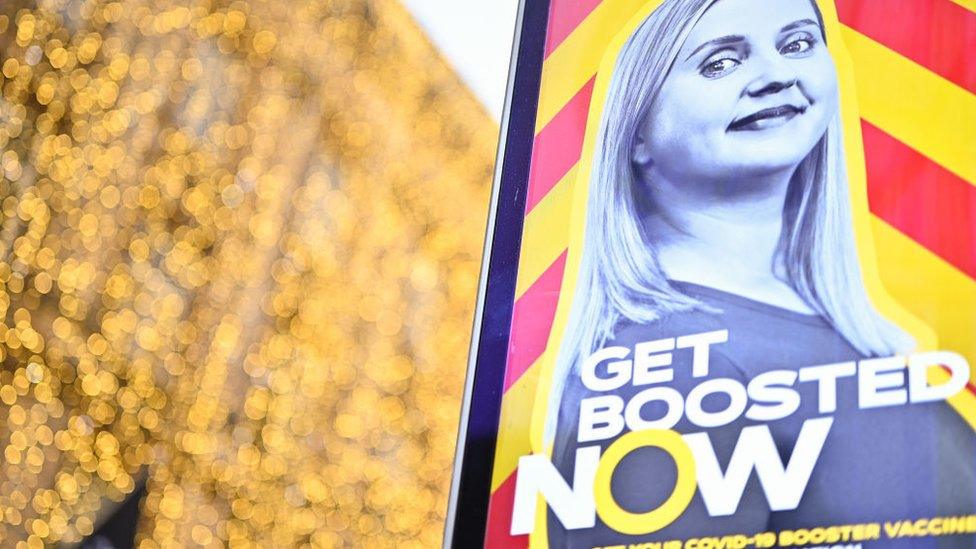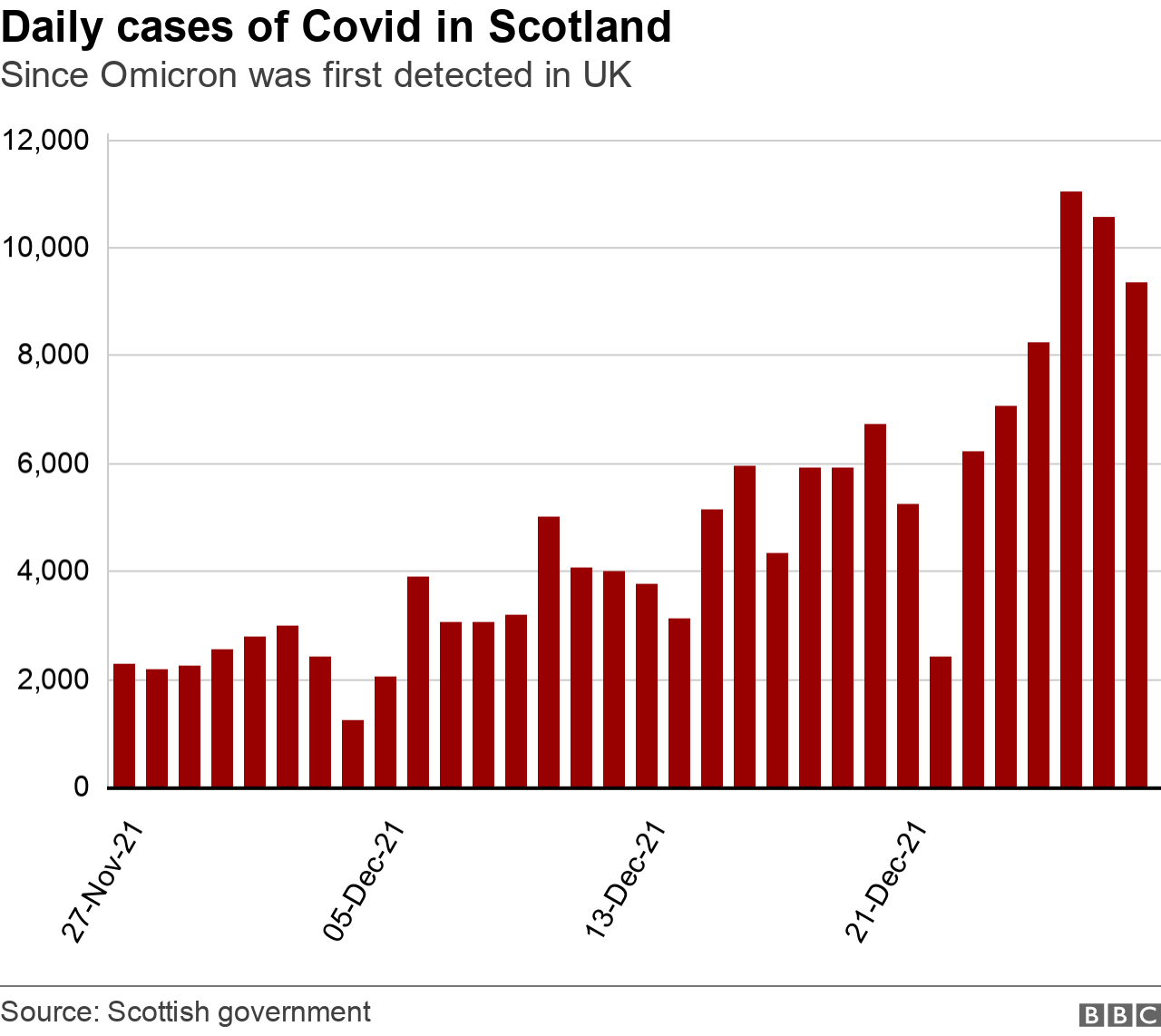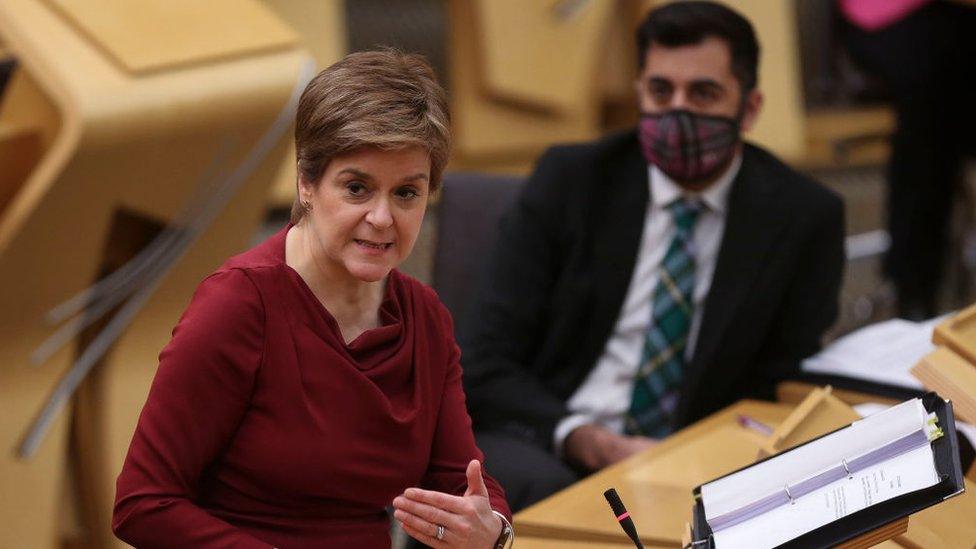Covid in Scotland: Nicola Sturgeon warns case numbers will rise
- Published

Nicola Sturgeon has warned Covid cases are likely to increase further as new figures indicate virus levels in Scotland remain at record levels.
A total of 9,360 people tested positive for coronavirus in the last 24 hours, according to the Scottish government.
It is the fourth day in a row that case numbers have exceeded 8,000, with a record high of 11,030 on Boxing Day.
Scotland's national clinical director Jason Leitch said about 85% of Covid cases in Scotland are now Omicron.
The first minister said: "While these figures remain provisional, the significantly increased transmissibility of Omicron is reflected in the steep increase in cases now materialising, and we would expect to see case numbers rise further in the days to come.
"I am grateful for the continued efforts of the public in complying with the guidance issued in the run up to Christmas. Without this, it is likely that the figures would have been even higher."
Early scientific analysis of the data shows people with Omicron are less likely to need hospital care compare with other variants - but experts have warned it could still lead to large numbers requiring inpatient treatment.
Ms Sturgeon urged people to get their booster and follow guidance on social gatherings and limit contacts to slow the spread of Covid.
"I know it is hard, but it is really important people continue to comply with the guidance over the new year period.
"We must not underestimate the impact of Omicron. Even if the rate of hospitalisation associated with it is lower than past strains of the virus, case numbers this high will still put an inevitable further strain on the NHS, and create significant levels of disruption due to sickness absence across the economy and critical services."

Omicron: What we know so far
This variant is very contagious - it spreads faster than others and can infect people even if they are fully vaccinated
Vaccines and boosters are still essential - they do a great job at protecting against severe disease that could put you in hospital
It is milder - if you catch it, the risk of needing hospital treatment is up to 70% lower than with previous variants - but that is largely because many of us have built up immunity from vaccines and past infections rather than changes to the virus
Even if Omicron is milder, because it is more contagious a large number of people will catch it and some will still become very ill, which puts pressure on the NHS.

Covid statistics are normally published by the Scottish government every day but they have been paused over Christmas.
A full update is expected on Wednesday but provisional updates on case numbers show:
25 December: 8,252 cases
26 December: 11,030 cases
27 December: 10,562 cases
28 December: 9,360 cases
Figures showing the number of people in hospital with virus have not been published since Christmas Eve, when there were 536 Covid patients in hospital and 47 in intensive care.
The following graph shows how Covid cases have increased in Scotland since the Omicron variant was first detected in the UK on 27 November.

The statistics were published as Ms Sturgeon prepared to update Holyrood on the Covid situation on Wednesday.
The virtual session was planned after restrictions on hospitality and leisure businesses were detailed last week.
Health Secretary Humza Yousaf has said no further restrictions are planned but the situation is under daily review

Nicola Sturgeon will meet with cabinet, including Health Secretary Humza Yousaf, ahead of the session
Ms Sturgeon is expected to hold a meeting with her cabinet to discuss the situation before parliament is recalled on Wednesday afternoon.
Another issue under "active review" is whether to shorten the isolation period around contacts and positive cases.
In England, people with Covid are only required to self-isolate for seven days, instead of 10, if two lateral flow tests are negative.
However this change has not been adopted by any of the other UK nations.
Mr Yousaf said there were risks in shortening the timescale and that parliament would be kept informed.

